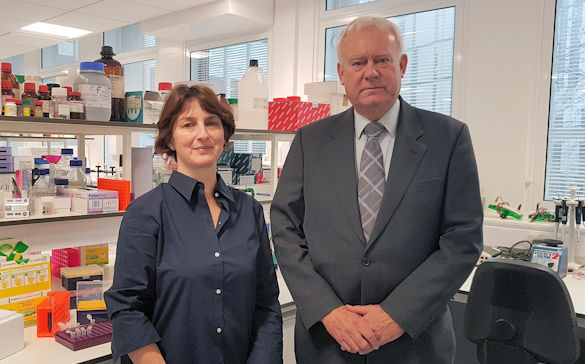
Professor Eithne Costello and pancreatic cancer survivor Peter Breaden
Scientists in Liverpool have been awarded £2.17 million by Cancer Research UK to develop ways to spot pancreatic cancer earlier.
Pancreatic cancer survival remains very low, with only 5 to 7 out of every hundred patients surviving the disease for more than five years. Around 8,700 people die from pancreatic cancer each year in the UK, including around 930 people in the North West.*
In eight out of ten patients, pancreatic cancer is diagnosed when it has already spread which limits treatment options.
About half of all people with pancreatic cancer develop diabetes before their diagnosis. But researchers don’t have a reliable way to distinguish pancreatic cancer-linked diabetes from normal type-2 diabetes, also known as diabetes mellitus.
In all, about one in every hundred people with type 2 diabetes have the condition because of underlying pancreatic cancer.
Future research
This new research at the University of Liverpool, funded by Cancer Research UK, will collect blood samples from people with newly diagnosed diabetes, and look for differences between those who later develop pancreatic cancer, and those who don’t.
The scientists will look for molecules in the samples – called biomarkers – that could form the basis for a way to identify people who could benefit from further cancer tests. Samples from people who take part in the study will be kept in a biobank, to allow for further studies which could help in future research.
Professor Eithne Costello, lead investigator at the University of Liverpool, said: “This funding from Cancer Research UK is vitally important to help us make great strides forward to developing a diagnostic test to identify pancreatic cancer earlier.
“We know about 65% of pancreatic cancer patients have a type of diabetes known as diabetes mellitus, when they receive their cancer diagnosis.
“In around 15% of cases, this diabetes is long-standing. But in around 50% of cases the patients with pancreatic cancer have developed this diabetes on average 13 months before their pancreatic cancer is identified.
“So scientists believe new-onset diabetes is an early warning sign of the presence of pancreatic cancer, and individuals with new-onset diabetes are the largest high-risk group for pancreatic cancer.”
2,500 patients
The Cancer Research UK-funded scientists will link in with scientists in Europe and the US who are developing similar patient groups.
Around 2,500 patients aged 50 years and older, newly diagnosed with diabetes mellitus from UK hospitals and general practices, will be given the chance to provide blood samples, complete a questionnaire and share their anonymised clinical data.
This study aims to make it feasible in the future to screen for pancreatic cancer in people with new-onset diabetes.
Dr David Crosby, Head of Early Detection Research, said: “Pancreatic cancer is one of Cancer Research UK’s identified cancers of unmet need, a strategic priority to improve survival rates that have remained flat for decades.
“By assembling a cohort of individuals at higher risk of developing pancreatic cancer, we believe Professor Costello and others will be able to identify signals that could help detect pancreatic cancer earlier and improve outcomes.”
Survival rates
Peter Breaden, 68, a retired lab manager and grandfather-of-nine from Southport, who was diagnosed with pancreatic cancer in April 2010 and successfully treated on a Cancer Research UK clinical trial, welcomed the funding.
He said: “I’m one of the lucky ones as I’m still here eight years after being diagnosed with pancreatic cancer. But my story isn’t the norm. Only 5 to 7 out of every 100 patients who is diagnosed with pancreatic cancer will still be here after five years.
“Sadly pancreatic cancer survival rates remain low and so more research – like the work being announced by Cancer Research UK today in Liverpool – is vital.
“It’s been really exciting to meet the scientists, see their lab and hear about the exciting work they will be doing which I hope will help to make a difference for future patients.”
Thanks to the generosity of its supporters, Cancer Research UK was able to spend over £28 million last year in the North West on some of the UK’s leading scientific and clinical research – helping more men, women and children survive the disease.
Cancer Research UK funds scientists and researchers based at the University of Liverpool. The charity holds various fundraising events through-out the year which are well-supported by people in Merseyside including Race for Life, Pretty Muddy, Shine and Stand Up To Cancer.
*These data were extracted from the Public Health England’s Cancer Analysis System, snapshot CAS8038. Accessed 22/01/2018. This work is only possible because of data from the cancer registry, which is routinely collected by the NHS as part of patient care.